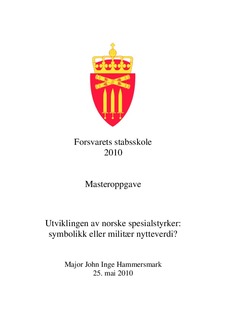| dc.description.abstract | This thesis analyses the evolution of Norwegian Special Forces from 1998 to 2010 with a focus on the FSK/HJK, Norwegian Army Special Operations Commando (NORASOC). Since the deployment in support of operations in Kosovo in 1999, the unit has experienced remarkable development and growth. The overall focus of this thesis answers the question: “What were the driving forces behind the evolution of Norwegian Special Operations Forces (SOF) from 1998 to 2010?” The introduction examines the history and theory of SOF in order to create a foundation in which to understand the fundamentals of SOF and Special Operations. The introduction also characterizes the components of the developed analytical framework for the thesis. The explanations for the evolution and the driving forces behind the evolution of FSK/HJK are discussed in two perspectives. The first is the functional perspective, which is the military utility of SOF. The second is the symbolic perspective, which consists of factors concerning politico-military profit and contribution warfare. Following the introduction, the thesis describes the development of FSK/HJK in three defined periods of time. The first period is from 1998 to 2001. During this period, the FSK/HJK changed their primary focus from domestic counterterrorist missions to include general SOF-missions. This time period was the first in which a full SOF-squadron was employed in support of operations (in Kosovo). The next notable period is from 2001 to 2003 and is primarily about the FSK/HJK deployment to Afghanistan. The last delineated period is from 2003 to 2010 and characterizes the continuous evolution towards a robust Norwegian SOF-regiment. Within each defined period of time the evolution is analysed with perspectives of functionalism and symbolism. The findings in the thesis suggest that the functional utility of FSK/HJK, particularly its utility in international operations, is the foundation and underlying basis for Norway to strengthen the SOF-capabilities. The symbolic effects were important to accelerate this evolution, but could not adequately maintain a definitive sustained level of progress without functional utility as the foundation. | en_US |
